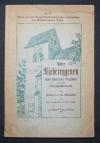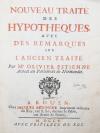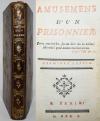Politics and government
Die Liste enthält 3 Einträge. Suchergebnisse löschen und Gesamtbestand anzeigen.
| Abbildung |
Beschreibung Gesamte Buchaufnahme |
Preis EUR |
|
|---|---|---|---|
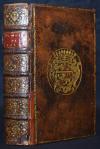 |
Joly, (Guy). Mémoires. Pour servir d’éclaircissement & de suite aux memoires de M. le C. de Retz. 2 Teile in 1 Band. Rotterdam, hértiers de Leers 1718. Kl.-8° (16 x 10 cm.). Titel in Rot u. Schwarz, 267 S.; Titel in Rot u. Schwarz, 254 S. Ldr. d. Zt. mit goldgepr. Rückensch., reicher Rückenvergoldung, Deckelfiletten u. Wappen-Supralibros.
Seltene erste Ausgabe der Erinnerungen des Pariser Richters G. Joly (?-1678). Joly arbeitete nach seinem Studium als Berater im Châtelet de Paris; seit 1667 arbeitete er für den Hof und verteidigte besonders die Rechte der Königin gegen die Verträge des königlichen Anwalts Stockmans. Die vorliegenden Memoiren verfasste er 1643 bis 1665 ein Jahr nach denen des Kardinal Retz. Sein Onkel der Schriftsteller Claude Joly (1607-1700) übersetzte die Memoiren ins Lateinische. – Gelenke stellenweise restauriert, schönes dekorativ gebundenes Exemplar aus der Schloss-Bibliothek des Grafen Bellanger, seigneur de Nanteuil La Fosse (?-1740). Schlagwörter: Frankreich, Politics and government, Politik |
220,-- |  |
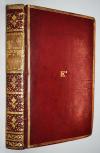 |
Moreau, (Jacob Nicolas). Principes de morale, de politique et de droit public, puisés dans l’histoire de notre monarchie, ou discours sur l’histoire de France, dédiés au Roi. Tome treizième (de 21). Paris, l’Imprimerie royale 1782. 8°. Titel, 446, XVI, (2) S. Weinroter Maroquineinband mit goldgepr. Rückenschild, reicher floraler Rückenvergoldung, dreifachen Deckelfiletten, goldgepr. Deckel- Monogramm „E.D“, Innenkantenvergoldung u. Goldschnitt.
13. Band der 21-teiligen Publikation (Paris 1777-1789) zur Politik und zum Staatsrecht des Ancient Regime. – Sehr schönes prachtvoll gebundenes Exemplar aus der englischen Schloß-Bibliothek Ragley Hall (Warwickshire, nähe Alcester und Stratford-upon-Avon), das Schloß diente als Filmkulisse für die Fernsehversion von „Das scharlachrote Siegel“ und wurde in der britischen Science-Fiction-Serie „Doctor Who“ (2006) als Kulisse (Schloß Versailles) verwendet. Schlagwörter: Einbände, France, Frankreich, Geschichte, History, Monarchy, Politics and government, Staatsrecht, Staatswissenschaften |
180,-- |  |
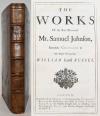 |
Johnson, Samuel. Works. London, Printed by John Darby, for Andrew Bell, Egbert Sanger, and Nathaniel Cliff 1710. Folio (34 x 23 cm.). XXVIII, 488 S. Ldr. d. Zt. über 5 Bünden mit goldgepr. Rückenschild.
Lowndes III, 1217. – Erste Gesamtausgabe und wichtiges Quellenwerk zur Politik in Groß Britannien. – „Chaplain to Lord William Russell. The works of this well-known party writer, stigmatized by Dryden under the name of Ben-Jochanan, are now in little estimation“ (Lowndes). – Der engl. Geistliche und poltische Schriftsteller S. Johnson (1649-1703), genannt „The Whig“ um ihn von dem gleichnamigen Schriftsteller und Lexikographen zu unterscheiden, war seit 1679 Kaplan von Lord William Russell. – „In 1833, Samuel Taylor Coleridge wrote, “I do not know where I could put my hand upon a book containing so much sense with sound constitutional doctrine as this thin folio of Johnson’s works.” The “Johnson” to whom Coleridge referred was not the celebrated Doctor Samuel Johnson of the eighteenth century but instead the late seventeenth-century Whig clergyman, the Reverend Samuel Johnson. Reverend Johnson’s single volume of complete works impressed Coleridge; he scribbled laudatory remarks throughout the margins of a 1710 edition. Coleridge admired the directness of Johnson’s style and his persuasive method of argumentation. Johnson would have appreciated Coleridge’s comments. They reflected the way he himself understood his work—as sound constitutional doctrine, plainly put. Yet for all its clarity and consistency, Johnson’s political thinking was not always appreciated by England’s political elite of the 1680s and 1690s. The implications of Johnson’s political ideas—much like those of his contemporary John Locke—were understood as far too revolutionary and destabilizing. However, Johnson’s fiery prose and sardonic wit often proved useful to the political opposition: from the Whig exclusionists of the early 1680s, to the supporters of William and Mary in 1688/89, to the radical Whigs and country Tories of the 1690s and early eighteenth century. Johnson’s career as a Whig propagandist spanned 1679 to 1700. Among his contemporaries, he was undoubtedly most renowned for his strident anti-Catholicism and for the brutal punishments that he endured for his radical politics“ (M. Zook, Early Whig Ideology, Ancient Constitutionalism, and the Reverend Samuel Johnson, Cambridge 2014). – „Die Whigs waren von den 1680er bis in die 1850er Jahre eine der beiden Parteien des britischen Parlamentarismus. Ihre Gegner waren die konservativen Torys. 1859 schlossen sich die Whigs mit gemäßigten Tories zur Liberal Party zusammen. … Die Bezeichnung Whig wurde ursprünglich beleidigend von den politischen Gegnern gebraucht und bedeutet ‚Viehtreiber‘ (Whiggamore). Erstmals wurde der Begriff für eine Parlamentsgruppe während der Krise um den Popish Plot und die Exclusion Bill in den Jahren 1679–1681 verwendet. Diese versuchte erfolglos, mit einer großen antikatholischen Verschwörungstheorie Jakob, Herzog von York, als Thronfolger seines Bruders zu verhindern. Der offizielle Name der Whigs war anfangs Country Party (Landpartei), als Gegensatz zu den Tories, der Court Party (Hofpartei)“ (Wikipedia). – Einband geringf. berieben, gestoch. Wappen-Exlibris, nur vereinzelt leicht braunfleckig, schönes Exemplar aus einer engl. Schloß-Bibliothek (″Knopogue Castle“). Schlagwörter: Controversial literature, England, Gesamtausgaben, Geschichte, Grossbritannien, Politics and government, Politik, Sermons, English, Theologie |
342,-- |  |
|
Einträge 1–3 von 3
Zurück · Vor
|
|||
| Seite: 1 |



